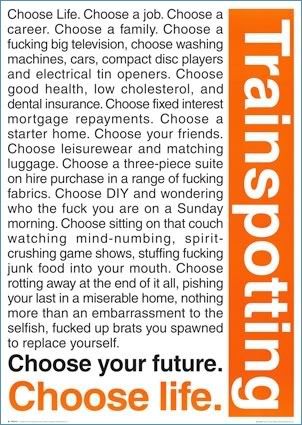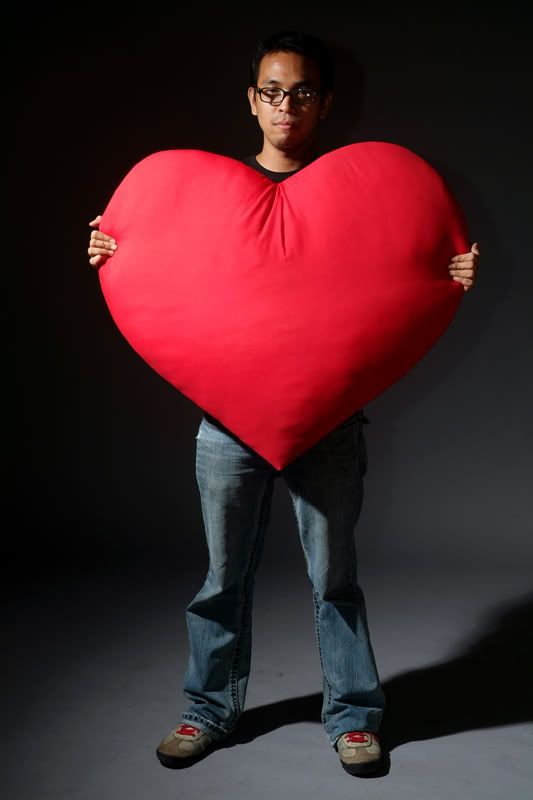Just the stirring in my soul
I wrote this essay more than two months ago, soon after some personal, erm, "distractions." It came out in the Youngblood section of the Philippine Daily Inquirer today. I originally entitled it "Quarter-life Crisis," but the editors changed it, apparently because that phrase has been used to death by countless souls like me determined to put a label on what we're going through.
Might as well post it here.
Unending Quest
Posted 00:59am (Mla time) Mar 31, 2005
By Paul John Caña
Inquirer News Service
WHO was it that said youth is wasted on the young? It's hard to disagree with him.
I turned 25 a few weeks ago and, for the life of me, I don't know what to answer if I'm asked what is the biggest achievement of my life so far. I suppose I can say that I graduated from college a couple of years earlier than most people and I now work in the news department of one of the biggest media companies in the country, and, yes, I write articles from time to time for a top music magazine. But somehow I have never really felt that these qualify as a "huge" accomplishment. To put it another way, I can't really say I'm living my life "to the fullest," whatever that means.
I would love to say that at this point I'm close to finding out what it is I am meant to do-and to be-for the rest of my life. But the truth is, I'm not. (Or maybe I am, but I'm not ready to knowledge it yet and let it course through my veins.)
Whether or not they care to admit it, I believe most people my age have no idea either. Many of us wander aimlessly about in the vast wasteland after college (for those of us lucky enough to even get to college), living on our never-high-enough salaries from our never-good-enough jobs. I'm sure there is a tiny percentage of young people out there who seem to have it all: a clear understanding of their place in the world and all the material blessings needed to achieve their goals. But for the rest of us, the search for meaning and purpose continues.
In the movie "Dead Poets Society," maverick English professor John Keating (played by Robin Williams) implores his students: "Carpe diem." That oft-repeated phrase and cursory advice given to young people by their elders, who most likely had never been able to "seize the day" themselves and merely want to impart stock wisdom on impressionable minds, is also one of the easiest to digest and to dismiss. All too often, young people live as though they would be young forever and procrastination becomes a habit. Before we know it, our 20s have passed us by and we tell ourselves, "Hey, this isn't so bad. I could do a lot worse with my life." Thus, the dream of finally doing what we want to do (as opposed to doing what essentially amounts to a "meantime" thing) remains a dream.
The problem sometimes isn't so much our willingness to finally start living the lives we want as trying to find the balance between what is attainable and what is simply beyond our capabilities.
In the same movie, a fellow professor, quoting Tennyson, tells Keating: "Show me the heart unfettered by foolish dreams, and I'll show you a happy man." To which Keating replies, "But it is only in their dreams can men be truly free. T'was always thus and always thus will be."
The kind of person we are, and possibly, who and what we turn out to be, depends on which of these two concepts more closely defines our attitude toward our deepest aspirations. Realists, by nature, are confident of their own abilities and very much aware of their limitations. These people are only as ambitious as they are pragmatic and so they are rarely disappointed.
On the other hand, those who subscribe to the Keating school of thought are bound only by their imagination and limited only by what they dare to dream. They are undaunted by the possibility of failure and are not afraid to take on any challenge. Life is the canvas on which they can paint any picture.
Whichever way we lean, the bottom line is that we all are working toward the same goal: happiness and personal satisfaction. But it doesn't have to end there. In fact, I don't think our struggle to find happiness should ever end, even after we get whatever it is we want in life. Personal fulfillment (of whatever kind) should be an unending quest. I've never believed that "people should be satisfied with what they have." That's like saying those who have nothing should just abandon the desire to improve their lives and simply accept their fate. Similarly, it shouldn't keep people who have achieved what may seem to be enough for others from setting new goals and continuing to work on improving themselves. Contentment should never be confused with complacency.
At this point in my life, while I may not be 100-percent certain of what I really want to do, what my purpose in life is and what I hope to achieve, it helps to be aware of that fact rather than blindly trudging on, without giving any thought to workable objectives and visible goals. At the very least, I'm trying to iron out the kinks in my life and starting to establish closer personal relationships with the people who mean much to me. I would like to think I have learned from the mistakes of the past, but as with many others, I anticipate making more of them in the days ahead. I have also noticed that I'm becoming much more vocal about my feelings, my need to let out how I feel taking precedence over my concern over how others will react. I realize that this can be a bad thing, but hey, carpe diem, right?
Paul John Caña, 25, works as a newsdesk administrator in one of the country's top broadcast networks.
Might as well post it here.
Unending Quest
Posted 00:59am (Mla time) Mar 31, 2005
By Paul John Caña
Inquirer News Service
WHO was it that said youth is wasted on the young? It's hard to disagree with him.
I turned 25 a few weeks ago and, for the life of me, I don't know what to answer if I'm asked what is the biggest achievement of my life so far. I suppose I can say that I graduated from college a couple of years earlier than most people and I now work in the news department of one of the biggest media companies in the country, and, yes, I write articles from time to time for a top music magazine. But somehow I have never really felt that these qualify as a "huge" accomplishment. To put it another way, I can't really say I'm living my life "to the fullest," whatever that means.
I would love to say that at this point I'm close to finding out what it is I am meant to do-and to be-for the rest of my life. But the truth is, I'm not. (Or maybe I am, but I'm not ready to knowledge it yet and let it course through my veins.)
Whether or not they care to admit it, I believe most people my age have no idea either. Many of us wander aimlessly about in the vast wasteland after college (for those of us lucky enough to even get to college), living on our never-high-enough salaries from our never-good-enough jobs. I'm sure there is a tiny percentage of young people out there who seem to have it all: a clear understanding of their place in the world and all the material blessings needed to achieve their goals. But for the rest of us, the search for meaning and purpose continues.
In the movie "Dead Poets Society," maverick English professor John Keating (played by Robin Williams) implores his students: "Carpe diem." That oft-repeated phrase and cursory advice given to young people by their elders, who most likely had never been able to "seize the day" themselves and merely want to impart stock wisdom on impressionable minds, is also one of the easiest to digest and to dismiss. All too often, young people live as though they would be young forever and procrastination becomes a habit. Before we know it, our 20s have passed us by and we tell ourselves, "Hey, this isn't so bad. I could do a lot worse with my life." Thus, the dream of finally doing what we want to do (as opposed to doing what essentially amounts to a "meantime" thing) remains a dream.
The problem sometimes isn't so much our willingness to finally start living the lives we want as trying to find the balance between what is attainable and what is simply beyond our capabilities.
In the same movie, a fellow professor, quoting Tennyson, tells Keating: "Show me the heart unfettered by foolish dreams, and I'll show you a happy man." To which Keating replies, "But it is only in their dreams can men be truly free. T'was always thus and always thus will be."
The kind of person we are, and possibly, who and what we turn out to be, depends on which of these two concepts more closely defines our attitude toward our deepest aspirations. Realists, by nature, are confident of their own abilities and very much aware of their limitations. These people are only as ambitious as they are pragmatic and so they are rarely disappointed.
On the other hand, those who subscribe to the Keating school of thought are bound only by their imagination and limited only by what they dare to dream. They are undaunted by the possibility of failure and are not afraid to take on any challenge. Life is the canvas on which they can paint any picture.
Whichever way we lean, the bottom line is that we all are working toward the same goal: happiness and personal satisfaction. But it doesn't have to end there. In fact, I don't think our struggle to find happiness should ever end, even after we get whatever it is we want in life. Personal fulfillment (of whatever kind) should be an unending quest. I've never believed that "people should be satisfied with what they have." That's like saying those who have nothing should just abandon the desire to improve their lives and simply accept their fate. Similarly, it shouldn't keep people who have achieved what may seem to be enough for others from setting new goals and continuing to work on improving themselves. Contentment should never be confused with complacency.
At this point in my life, while I may not be 100-percent certain of what I really want to do, what my purpose in life is and what I hope to achieve, it helps to be aware of that fact rather than blindly trudging on, without giving any thought to workable objectives and visible goals. At the very least, I'm trying to iron out the kinks in my life and starting to establish closer personal relationships with the people who mean much to me. I would like to think I have learned from the mistakes of the past, but as with many others, I anticipate making more of them in the days ahead. I have also noticed that I'm becoming much more vocal about my feelings, my need to let out how I feel taking precedence over my concern over how others will react. I realize that this can be a bad thing, but hey, carpe diem, right?
Paul John Caña, 25, works as a newsdesk administrator in one of the country's top broadcast networks.




